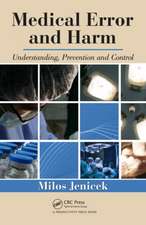How to Think in Medicine: Reasoning, Decision Making, and Communication in Health Sciences and Professions
Autor Milos Jeniceken Limba Engleză Paperback – 30 iun 2021
Mastery of quality health care and patient safety begins as soon as we open the hospital doors for the first time and start acquiring practical experience. The acquisition of such experience includes much more than the development of sensorimotor skills and basic knowledge of sciences. It relies on effective reason, decision making, and communication shared by all health professionals, including physicians, nurses, dentists, pharmacists, and administrators.
How to Think in Medicine, Reasoning, Decision Making, and Communications in Health Sciences is about these essential skills. It describes how physicians and health professionals reason, make decision, and practice medicine. Covering the basic considerations related to clinical and caregiver reasoning, it lays out a roadmap to help those new to health care as well as seasoned veterans overcome the complexities of working for the well-being of those who trust us with their physical and mental health.
This book provides a step-by-step breakdown of the reasoning process for clinical work and clinical care. It examines both the general and medical ways of thinking, reasoning, argumentation, fact finding, and using evidence. It explores the principles of formal logic as applied to clinical problems and the use of evidence in logical reasoning. In addition to outline the fundamentals of decision making, it integrates coverage of clinical reasoning risk assessment, diagnosis, treatment, and prognosis in evidence-based medicine.
Presented in four sections, this book discusses the history and position of the problem and the challenge of medical thinking; provides the philosophy interfacing topics of interest for health sciences professionals including the probabilities, uncertainties, risks, and other quantifications in health by steps of clinical work; decision making in clinical and community health care, research, and practice; Communication in clinical and community care including how to write medical articles, clinical case studies and case reporting, and oral and written communication in clinical and community practice and care.
| Toate formatele și edițiile | Preț | Express |
|---|---|---|
| Paperback (1) | 348.58 lei 6-8 săpt. | |
| Taylor & Francis – 30 iun 2021 | 348.58 lei 6-8 săpt. | |
| Hardback (1) | 453.60 lei 6-8 săpt. | |
| Taylor & Francis – 15 mai 2018 | 453.60 lei 6-8 săpt. |
Preț: 348.58 lei
Nou
Puncte Express: 523
Preț estimativ în valută:
66.71€ • 69.46$ • 56.38£
66.71€ • 69.46$ • 56.38£
Carte tipărită la comandă
Livrare economică 10-24 martie
Preluare comenzi: 021 569.72.76
Specificații
ISBN-13: 9781032095424
ISBN-10: 1032095423
Pagini: 568
Ilustrații: 43 Illustrations, black and white
Dimensiuni: 178 x 254 x 34 mm
Greutate: 1.05 kg
Ediția:1
Editura: Taylor & Francis
Colecția Productivity Press
Locul publicării:Oxford, United Kingdom
ISBN-10: 1032095423
Pagini: 568
Ilustrații: 43 Illustrations, black and white
Dimensiuni: 178 x 254 x 34 mm
Greutate: 1.05 kg
Ediția:1
Editura: Taylor & Francis
Colecția Productivity Press
Locul publicării:Oxford, United Kingdom
Public țintă
Professional Practice & DevelopmentCuprins
Foreword; Introduction; Section 1: History and position of the problem, and the challenge of medical thinking. Philosophy for medicine: yesterday and today; Chapter 1: How did we get where we are today?; Chapter 2: Philosophy and medicine. How much are we philosophers?; Chapter 3: Art, craft, science: aren’t we also all this and above?; Chapter 4: Ways we see, learn, and practice medicine today; Chapter 5: General rules of critical thinking, argumentation, and logic in medical research and practice; Chapter 6: The scientific method. Not only for science but for practice too!; Chapter 7: Evidence-based medicine, patient-centered and otherwise centered medicines, and clinical practice sharing a common line of thought.; Section2: Philosophy interfacing topics of interest for health sciences and professions across the cognitive process in health care and research; Chapter 8: Definitions of What we want to see and what we can do.; Chapter 9: Probabilities, uncertainties, risks, and other qualifications in health by steps of clinical work; Chapter 10: Cause-effect relationships; Chapter 11: Thinking by steps of clinical and community care.; Section 3: Decision making in clinical and community health care, research, and practice; Chapter 12: Fundamentals of decision analysis and decision making; Chapter 13: Decision making in clinical and community care.; Chapter 14: Communication in research and practice.; Chapter 15: Writing medical articles; essays, scientific papers; Chapter 16: Clinical case and case series reporting; Chapter 17: Oral and written communication in clinical and community practice and care; Appendix 1: Other references; Appendix 2: Glossary
Notă biografică
Milos Jenicek, MD, PhD is Professor of Epidemiology and Evidence-Based Medicine at McMaster University in Hamilton, Ontario, Canada. He is also Professor Emeritus at the Université de Montreal, Adjunct Professor at McGill University and Fellow of the Royal College of Physicians and Surgeons of Canada. In 2009, he was elected Fellow of the Royal Society of Medicine, London, UK.
He contributes to the evolution of epidemiology as a general method of objective reasoning and decision making in medicine. To further enhance his teaching and research, he has committed himself to short sabbaticals during which he visited Harvard and John Hopkins, Yale, North Carolina at Chapel Hill and Uniformed Services at Bethesda Universities. He also lectured and visited numerous institutions in Hong Kong, Singapore, Japan, South Korea, Portugal, Brazil, France, Switzerland, Morocco, Czech Republic, Singapore and Kuwait. Earlier in his career, he spent three years of University teaching and field practice of preventive medicine and public health in North Africa, which has given him valuable insight and understanding of the realities in this part of the world.
Milos Jenicek is a consultant to various national and international public and private bodies, Editorial Consultant for the Journal of Clinical epidemiology and the Case Reports & Clinical Practice Review and honorary editorial board member of Evidence-Based Preventive Medicine. In addition to numerous scientific papers, Dr. Jenicek is the author of twelve books, his most recent Evidence-Based Practice published by AMA Press in 2005, A Physician’s Self-Paced Guide to Critical Thinking (2006, AMA Press); Improving Communication and Decision Making in Research and Practice, (AMA Press, 2009) and Medical Error and Harm: Understanding, Prevention and Control (CRC Press, 2009).
Dr. Jenicek’s current interests include the development of methodology and applications of logic and critical thinking in health sciences, enhancement of evidence-based medicine and evidence-based public health, health policies, program evaluation, and decision oriented (bedside) clinical research.
He contributes to the evolution of epidemiology as a general method of objective reasoning and decision making in medicine. To further enhance his teaching and research, he has committed himself to short sabbaticals during which he visited Harvard and John Hopkins, Yale, North Carolina at Chapel Hill and Uniformed Services at Bethesda Universities. He also lectured and visited numerous institutions in Hong Kong, Singapore, Japan, South Korea, Portugal, Brazil, France, Switzerland, Morocco, Czech Republic, Singapore and Kuwait. Earlier in his career, he spent three years of University teaching and field practice of preventive medicine and public health in North Africa, which has given him valuable insight and understanding of the realities in this part of the world.
Milos Jenicek is a consultant to various national and international public and private bodies, Editorial Consultant for the Journal of Clinical epidemiology and the Case Reports & Clinical Practice Review and honorary editorial board member of Evidence-Based Preventive Medicine. In addition to numerous scientific papers, Dr. Jenicek is the author of twelve books, his most recent Evidence-Based Practice published by AMA Press in 2005, A Physician’s Self-Paced Guide to Critical Thinking (2006, AMA Press); Improving Communication and Decision Making in Research and Practice, (AMA Press, 2009) and Medical Error and Harm: Understanding, Prevention and Control (CRC Press, 2009).
Dr. Jenicek’s current interests include the development of methodology and applications of logic and critical thinking in health sciences, enhancement of evidence-based medicine and evidence-based public health, health policies, program evaluation, and decision oriented (bedside) clinical research.
Descriere
This book provides a step-by-step breakdown of the reasoning process for clinical work and clinical care. It examines both the general and medical ways of thinking, reasoning, argumentation, fact finding, and using evidence. It explores the principles of formal logic as applied to clinical problems and the use of evidence in log



